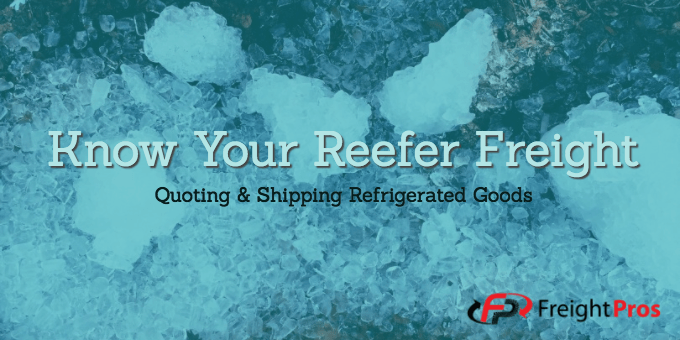Reefer Freight is the codeword for “Refrigerated Freight,” and the systems and practices in place for reefer freight, versus a regular LTL or Truckload shipment, or even something like an overnight shipping quote, are very different. So if you’re looking to set up a one time only refrigerated shipment, or if you’re preparing to get into reefer shipping full-time, there are some basic facts you need to know. Luckily, you’ve come to the right place.

What’s Reefer Freight? How’s it unique?
Reefer freight is shipping speak for “Refrigerated freight.” Anytime you’re shipping freight that needs to be temperature controlled, you’re going to need to get a reefer shipping quote. Reefer can be applied to all sorts of transportation modes (truck, train, ship, intermodal, etc.), but for today’s purposes we’re going to stick with LTL (Less-Than-Truckload) and Truckload refrigeration. Reefer freight is unique in a number of ways including equipment, quoting, and in-transit practices. Let’s dive into some of these differences.
Breaking Down Reefer Equipment
In freight, we use the term “equipment” to describe the trucks that will be picking up and delivering the shipments. The normal truck used in freight shipping is a dry van, usually one that’s 48 or 52 feet in length. Though these trucks can be insulated or ventilated, they won’t be able to hold the particular temperature the way a reefer truck will.
A refrigerated truck is equipped with a cooling system that will keep the cargo of the truck at a desired low temperature. These refrigeration systems are often powered by a small engine on the truck, though you may also run into the use of carbon dioxide in the form of dry ice to keep the truck cool. These reefer freight trucks come in a variety of sizes depending on your needs, from full size 52 ft. reefers, to smaller box trucks used primarily for LTL shipments.
Getting Reefer Quotes
Because reefer trucks are rarer than your standard dry van, reefer quotes are more expensive than your standard LTL or truckload quote. These refrigerated trucks are more expensive to produce and run (because of the additional power needed to keep the truck cool), and therefore their shipping quotes are set at a higher price. Because of their availability, it’s also more difficult to get a reefer truck for pickup. You’ll need to be flexible in your pickup dates, and make sure you plan accordingly.
Reefer freight shipments, as a whole, are more sensitive than your standard truckload or LTL shipment. You’ll want to have your shipment absolutely ready at time of pickup, as each minute a reefer truck idles, is another dollar out of your pocket. When it comes time to ship, you’ll still need to package your shipment correctly with boxes and pallets. The trucks will still load and unload via freight docks, so you’ll still need standard warehouse equipment such as a forklift.
The main thing to remember about reefer shipping quotes, is their higher price.
Final Thoughts on Refrigerated Shipping
If you’re looking to get a reefer freight quote, you should reach out to a freight broker. They’ll be able to negotiate a fair rate for your shipment, and the good ones will track your freight in transit and make sure it gets delivered. They’ll also be knowledgable about particular “hot” or “cold” markets for refrigerated shipping carriers, so you won’t be paying higher costs than necessary.
Reefer quotes will vary based on capacity, shipping seasons, and geographic locations. Most reefer trucks will keep frozen items throughout transit, but you’ll need to confirm with your broker and carrier of the temperature ranges available for your shipment.
Reefer shipping is much more common in truckload shipping than LTL. If you’re looking for LTL reefer quotes they’re out there, but be prepared to pay a premium price. If you’re shipping full truckload, make sure you’re using a reputable carrier with sufficient insurance. And if you’re moving perishable items. Most carriers won’t take onions (smell), potatoes (messy), and other stuff, so make sure you’re moving the right stuff before you schedule the pickup.